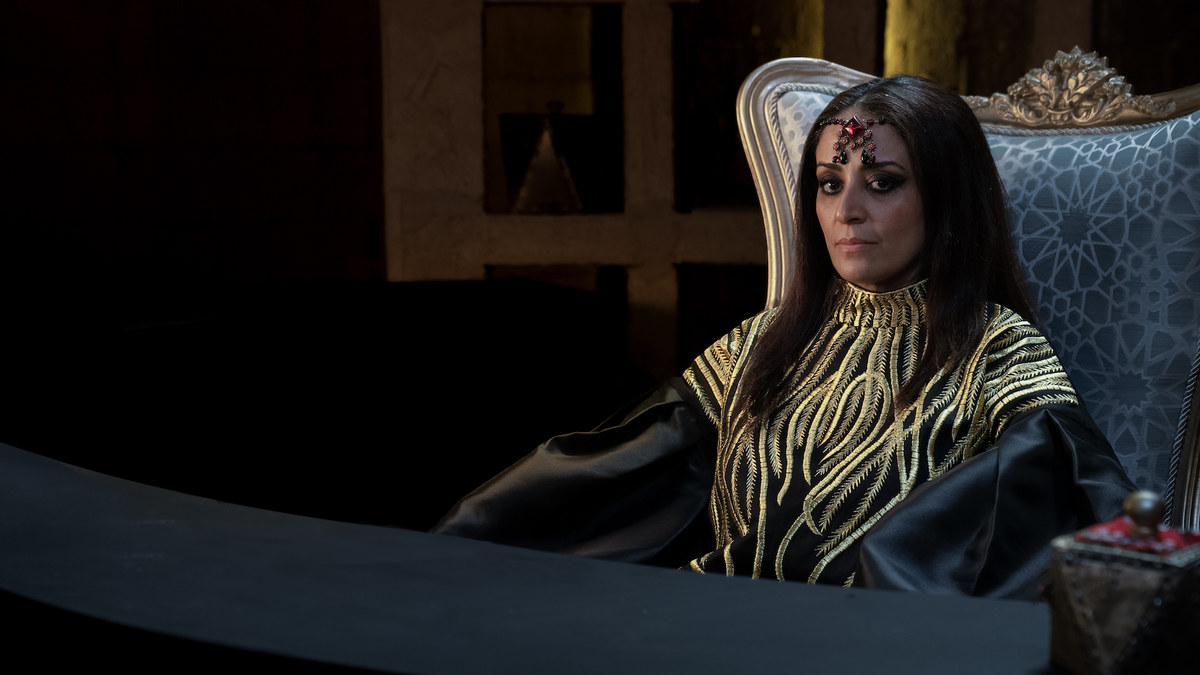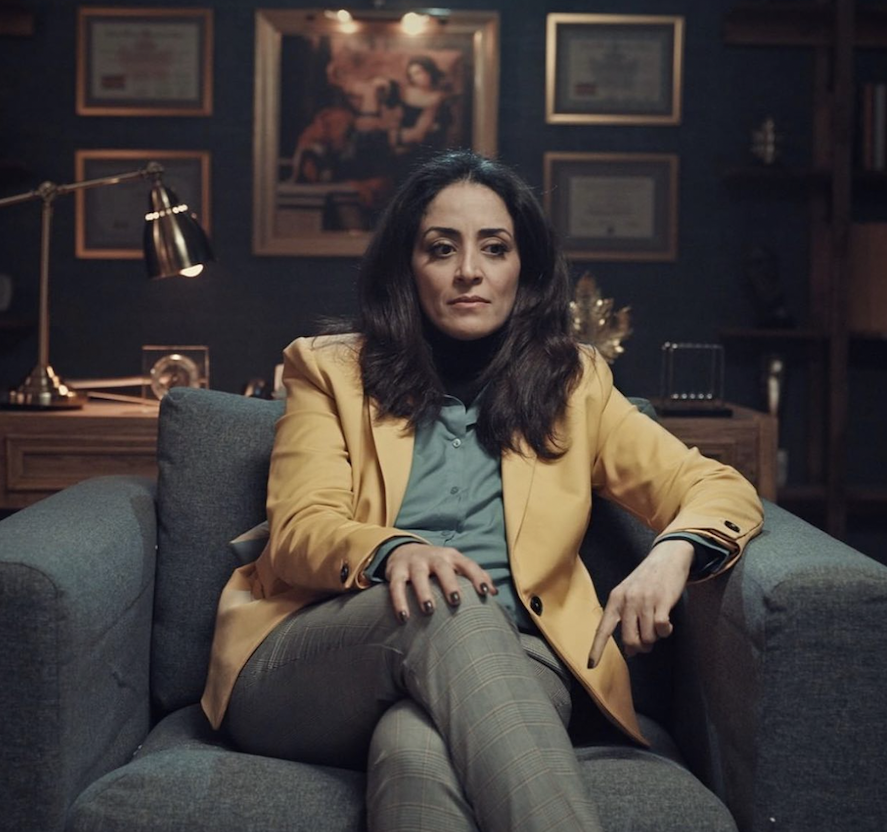DUBAI: There has never been a role like this for a Saudi woman before. Actress Reem Al-Habib, in the near 15 years she’s been performing professionally, had been hoping that, one day, she would get the call to play someone that would break her free of the usual roles of the mother, daughter, or sister. She yearned to use her talents to explore a darker character, the kind usually reserved for men. Finally, as the titular character in Netflix’s “The Matchmaker,” billed as Saudi’s first psychological thriller, Al-Habib got her wish — and then some.
“I was reading through the script, and I said to myself, ‘Oh gosh, hold on — this is actually a villain. Where did this come from?” Al-Habib tells Arab News. “Having a Saudi female character as the villain shocked me. I was like, ‘Wow, she’s almost a serial killer.’ There’s so much psychological depth. I was hooked. I needed to dive deeper into this world.”

Reem Al-Habib in 'The Matchmaker' 2. (Supplied)
With the film receiving a global release on the world’s biggest streaming platform on April 27, Al-Habib has the chance to make her mark on the world stage, showing the kind of range that could lead to parts she once never thought possible. There was a time, of course, when acting itself seemed an impossibility, as she grew up in a conservative ‘tribal’ family, as she calls it, that viewed public performance itself as a shameful act.
“Acting was a huge taboo — the worst nightmare for a family like mine. We weren’t really allowed to do anything with art, because art itself was associated with the lowest spectrum of society. It was viewed as a dirty environment, an unsafe environment, and in Saudi Arabia, it was a career that seemingly had no future,” says Al-Habib.
As a result, Al-Habib had no ambitions in the space. As a kid, she would imitate characters, do voices, but it was just a form of play, somethings she never thought others besides her immediate family might see. But when she went to university in the United States, she was compelled to participate in a play as part of her curriculum, and found that she had hidden talents.

Reem Al-Habib in 2022's 'Love, Life & Everything in Between.' (Netflix)
“Everyone said I was the best of the 300 students. I thought, ‘Wait, is this something I can do for real?’” says Al-Habib. “Then I returned to Saudi, and I forgot about acting entirely.”
Al-Habib thought her acting days were over, until she received a frantic phone call in 2009 from a director friend who had created a guerilla-style YouTube series.
“He said, ‘Reem, my actress has disappeared. She turned off her phone. She never showed up to set. I need help. Can you come over and take her place?’” says Al-Habib.
She immediately went to the aide of her close friend, performing a small scene playing a character’s mother. While she enjoyed it, she thought it was just a nice way to spend an afternoon, and things would immediately go back to normal. They didn’t.
“It just went viral. People were sharing it all over,” says Al-Habib. “The comments on YouTube were all asking about me: ‘Who is this girl? What’s her name? Where’s her account? How can I see more?’ Then Ali Al-Kalthami, one of the founders of Telfaz11, posted the scene on Twitter, with the caption: ‘Reem Al-Habib is the best actress in the region.’
“I thought it went OK,” she continues, “but I never expected anything like this.”
Al-Habib soon received a call from MBC, who offered her a role in the series “Harat Al-Sheikh,” a folk tale set in Old Jeddah about two brothers who ended up on opposite paths in life.
“I accepted the role, but it was very difficult for me at the time. I was a new mom, and it was so hard for me to leave my son and travel, living in a hotel for a few months doing 14- to 16-hour shoots every day. But it was well received, and I started getting a lot of offers for new projects, and things kept rolling,” says Al-Habib.
She refused most of the roles she was offered — as she still does today — because she wasn’t interested in characters that felt too safe, that couldn’t lead to a true turning point that could take her to the next level.
“Most producers are afraid to break out of the box, afraid to place a woman in a role that’s too bold or a bit edgy. It takes guts and knowledge to push the boundaries a bit more, and that’s what I’ve always been hoping for. I’ve even turned down huge roles in major Ramadan shows — I turned down three Ramadan shows this year alone — because I’m not interested in these one-dimensional female characters,” says Al-Habib.
Fittingly, it’s her old friends at Telfaz11 that are offering the characters she’d always been hoping for, first in a role in the anthology Netflix series “Love, Life and Everything in Between,” and now as the menacing matchmaker in their latest original feature film.
“There are so few producers coming up with extreme, unique, and out of the norm roles for women. I just want women to play roles that are closer to society. We see the abused woman, the loved woman, but we rarely see the criminal, the mentally unbalanced, the psychopathic, or the seriously flawed. We need to see the darkness, the nasty, the taboo, or we’re not seeing the full spectrum of the human experience, which is what this artform is all about,” says Al-Habib.
Al-Habib takes this all very personally, and it’s easy to understand why. While she says she’s still close to her father and siblings, her career has cut her off from the rest of her family.
“My extended family — aunts, uncles, cousins — have disowned me. I’m no longer in contact with them since I pursued acting,” she says.
“I got over it,” Al Habib says when we suggest how difficult that must be. “I guess I’m a tough cookie. I have a high amount of awareness and forgiveness, and I don’t hate them for it. I took it as them being incapable of understanding my choice, because it goes against the way they see the world. They can’t see it my way. I was upset at the time, but I said to myself, ‘This is their choice, and one day they’ll come around.’ And I stuck to what I wanted to pursue.”
Al-Habib refused to be put into a box then, just as she does now in the roles she chooses.
“I was great at playing a mother, but a great actress can play anything. I won’t be suffocated in that box,” says Al-Habib.
With “The Matchmaker,” Al-Habib can finally show the world how great she truly is.












